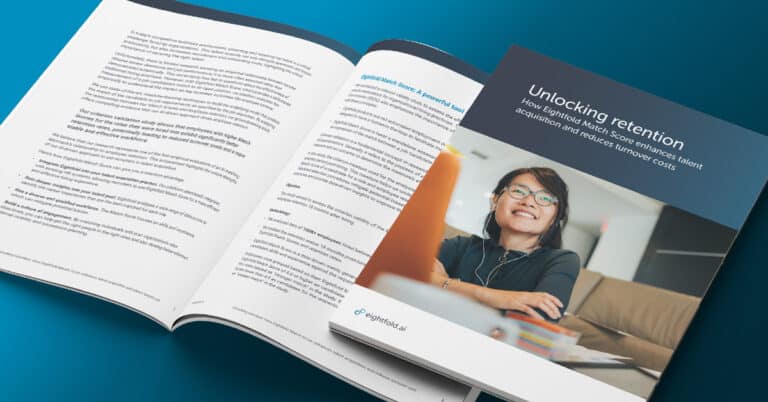Attracting and retaining top talent is critical in today’s competitive business environment. The increasing costs of recruiting and onboarding highlights why it’s more important than ever to secure the right talent.
Traditional hiring practices aren’t as effective. It’s time for something different — learn how Eightfold’s Match Score provides a skills-based measurement of a candidate’s match to an open position to ensure you’re hiring the right person from the start.
In this report, you’ll also learn:
- How to gain deeper insights into your talent pool, providing better career paths for employees.
- What it takes to hire a diverse and qualified workforce.
- Why it’s important to build a culture of engagement for internal mobility and succession planning.
In today’s competitive business environment, attracting and retaining top talent is a critical challenge faced by organizations. This talent scarcity not only disrupts operations and lowers productivity, but also increases recruitment and onboarding costs, highlighting the critical importance of securing the right talent
Unfortunately, there is limited research showing an empirical relationship between recruiter résumé review decisions and job performance; it is more often assumed rather than demonstrated empirically. This uncertainty has led to questions about the effectiveness of traditional hiring practices. However, with Eightfold Match Score, which provides a skills-based measurement of a job candidate’s match to an open position, our platform evaluates this empirically to understand the impact on key business outcomes like employee turnover.
We use state-of-the-art, machine-learning techniques to build the underlying model that predicts the match of the candidate to job requirements as specified by the job requisition. By analyzing the relationship between our Match Scores and employee retention, our groundbreaking study offers compelling evidence that our AI-driven approach drives employee retention.
We believe that our research represents one of the first empirical evaluations of an AI matching approach’s relationship to employee retention. This achievement highlights the unique strengths of our AI-driven approach to aid recruiters in talent acquisition.
- Integrate Eightfold into your talent acquisition process. Our platform seamlessly integrates with existing HR systems, allowing recruiters to use Eightfold Match Score for a more efficient and effective hiring experience.
- Gain deeper insights into your talent pool. Eightfold analyzes a wide range of data points to identify the career trajectories that are the best matched for each role.
- Hire a diverse and qualified workforce. The Match Score focuses on skills and experience, which can mitigate potential biases.
- Build a culture of engagement. By matching individuals with your organization’s roles objectively, you can help get the right people in the right roles and also develop better informed internal mobility and succession planning.
Eightfold Match Score: A powerful tool for understanding retention
We conducted a criterion validity study to assess the effectiveness of our Eightfold Match Score and its implications for organizational hiring practices. The Equal Employment Opportunity Commission (EEOC) also emphasizes the importance of fair talent acquisition practices. In line with these principles:
- Eightfold products are not automated employment decision-making tools. Our products are designed to have a human-in-the-loop to facilitate more informed human decision-making.
- Eightfold Match Score is never a standalone assessment of any person. Instead, it is always an expression of the match between a job candidate to a particular position.
Criterion validation is a fundamental concept in research methodology, particularly in the field of psychometrics. Generally, it refers to the process of establishing the relationship between a measure and an outcome to determine the measure’s effectiveness in predicting the outcome.
In this study, the criterion measure used for the analysis is the employee retention during the analysis period post-hiring. This measure helps us understand the relationship between Eightfold Match Score of a candidate for a role and employee retention of the candidate post-hiring. Validated selection procedures mitigate potential biases that may be present in traditional hiring practices and provide data-driven insights to improve the quality of hiring decisions.











